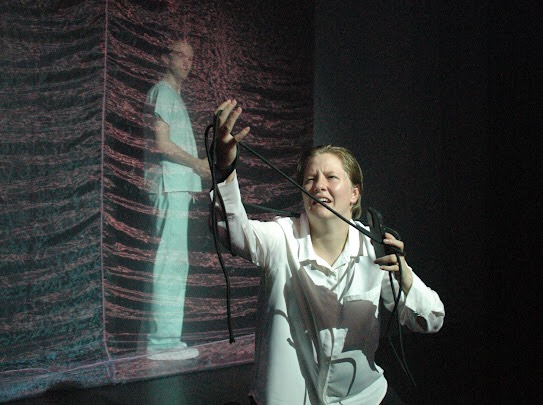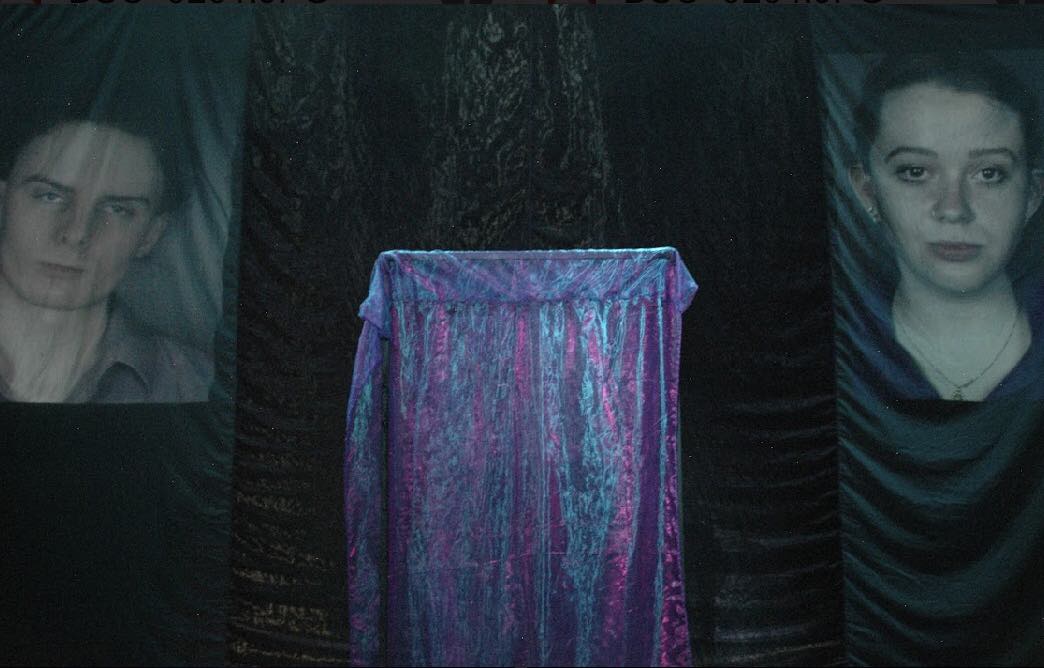‘The Flu Season’, written by Will Eno and directed by Michelle Fry as part of their honours course, was a fascinating and deeply moving production, playfully pulling between sadness and sharp humour. Set in the depressing scene of a psychiatric centre, ‘The Flu Season’ exposes the expanse of human experience by placing its setting in a place defined by vulnerability and fragility. The memorable performances by the entire cast and the thoughtful direction by Fry contributed to the play’s craftily handled manipulations of time, tension and transitions.
Sydney Madsen and Adam Ryan Watt play Doctor and Nurse respectively. As mental health professionals, both perfectly embody a liveliness that frustrates the patients and the audience. This dynamic pushes the narrative forward the Doctor and Nurse ask personal questions of the newly imported patients and interject with personal and irrelevant anecdotes. They make a compelling case for the trauma injected in the process of seeking help for trauma and this extends beyond the confines of a psychiatric centre. Often, we feel our deeply complex issues are met with an impersonal, incomplete reply from people in our life. but then, who can provide the answers we need?
As the play progresses, Madsen’s and Watt’s stage presence is commanding. Their quick-witted dialogue and fast movements across the stage keeps time moving forward in a space where time is suspended, a place where you are separated from your family and the rest of the world. It also communicates a sense of disconnection, as if they are half-stuck in the real world in a way that the patients can’t be so long as they are stuck in the psychiatric centre.
Yet, the shield of invulnerability that enclosed the Doctor and Nurse begins to break down as we uncover more of who they are. As their humanness begins to unfurl, a budding romance between the two of them forms and there is an increasingly overwhelming sense that they too are stuck between walls of the psychiatric centre, that they too are victims to the cruelty of time.
Jarrah Carlile as Prologue and Kaitlin Walsh as Epilogue are ever-present voices throughout the play, first introduced at the beginning each with a monologue. Fry’s choice to project these characters on both ends of the stage evokes a sense of separation. The Prologue pulls the past away from the events on the stage and invites the audience into a romance in the depths of sadness. There is a sense of hope, even in the play’s blue winter setting. Carlisle’s perfect timing and tone in delivering monologues makes them overflow with romance and sadness.
Walsh’s Epilogue is a counterpart, a reaction, a bitterness to Prologue. Anger at the melancholia, the years of wasting and sickness, of writing, of trying, of finding a place, of waiting in the in-between – this is what Walsh embodies as Epilogue. Beyond the projection of these two characters across either end of the stage, the sense of tension between these two states of being – Epilogue and Prologue – is captured in Epilogues response to Prologue, a kind of rebuttal to the dream-like world that Epilogue exists in. Prologue seems to proclaim a truer sense of reality.
Still, the play very much embodies a dream-like in-between. The psychiatric centre is suspended in space, a vacuum where the sick stay until they can be in the real world again. Fry’s choice to project these voices as opposed to having them on stage in person and use of props encapsulates the dream-like setting. Notably, sheer purple fabric hanging on black frames become symbols for hospital curtains, walls between enclosed spaces, tension between characters, and a slipping reality, an imagination of what could be.
Both Madilyn Burden as the Woman and Kate Steele as the Man perform impressively, and their chemistry was engaging to see unfold. From the beginning, Burden commands attention on stage from the play’s first dance sequence to the notable control of dialogue, responding with perfect timing and tension, fleshing out the brilliance of the writing and fortifying the impeccable directing. Kate Steele as the Man performed with excellent comedic timing and control of expression. The slow reveal of their past is captured in words caught in moments, the audience worked to string things together.
Burden and Steele develop an interesting romance, the relationship anchored by a deep knotted feeling of sadness. You begin to sense that the vacuum of the psychiatric centre is not so air-tight and the real-world is slipping in.
Both the Man and the Woman perform their moments of crisis with such force as the on-stage world unravels in an enrapturing final act of the play.
With all of work that the director, the actors and production team have invested into this performance, it is unmistakably clear the talent these individuals possess and the success of their collective effort.
‘The Flu Season’ is for anyone stuck in one place, looking out into the world through a frosted glass window. For anyone who has ever been the anti-hero. Or if you just need the company of some good theatre, this play is for you.

Images: Chloe Begbie / @begbiefilm (instagram)




